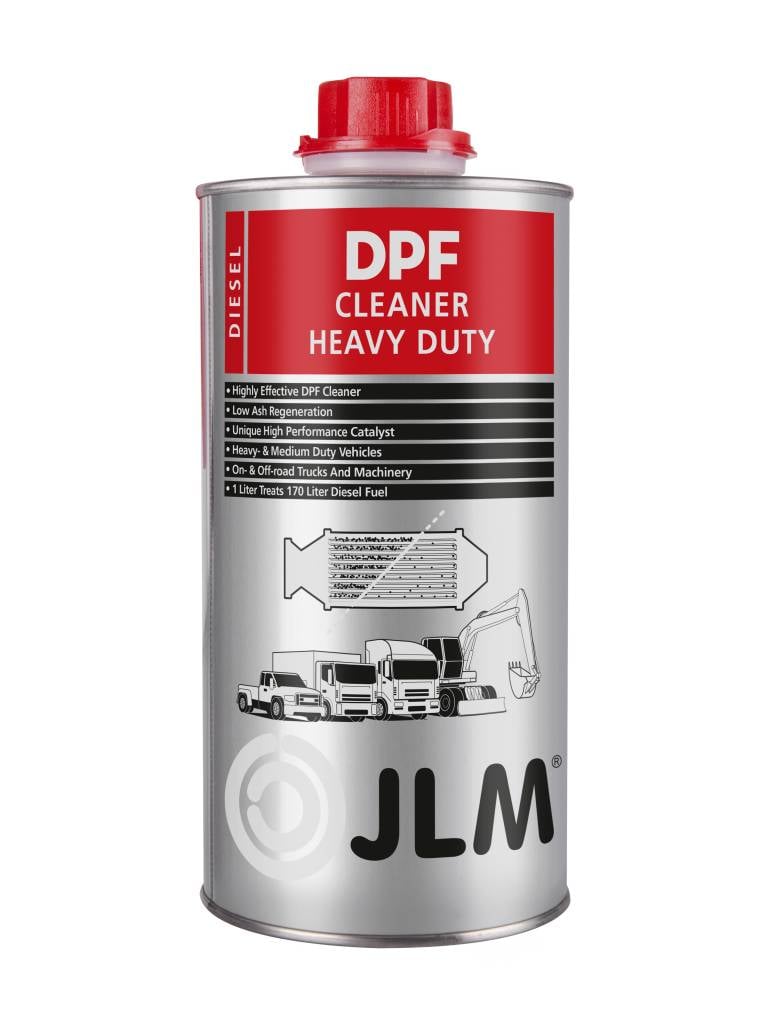
Diesel DPF Cleaner Heavy Duty
JLM DPF Cleaner Heavy Duty is one of the best diesel particulate filter cleaners for trucks and fleet owners on the market. JLM DPF Cleaner Heavy Duty contains a very high concentration of the active additive
Read more| Brand: | JLM Lubricants |
| Article number: | J02215 |
Almost all modern trucks are equipped with Diesel DPF or Diesel particulate filters, and even many older trucks and buses have been retrofitted with the DPF as major additions to exhaust systems due to changing regulations in recent years.
DPF filters are much more complex and expensive pieces than the simple mufflers they replaced.
The DPF filter captures incompletely combusted fuel (soot) from the truck’s engine that would otherwise end up in the environment. In the course of time the filter becomes full. The truck's electronics ensure that this soot is burned during motorway driving or when the engine is under a heavy load. This is known as regeneration.
However, many trucks only make short journeys (delivery trucks) as a result of which the engine is hardly under any load at all. As a result, regeneration does not occur and soot continues to accumulate in the diesel particulate filter. Eventually the filter becomes blocked. The orange warning light with the diesel particulate filter symbol lights up on the dashboard and normally the truck has either do a forced - or active regeneration while being parked next to the road, or in the worst case scenario taken to the garage or service station.
JLM DPF Cleaner Heavy Duty solves this specific problem. There is no need to remove the diesel particulate filter. This saves a lot of downtime and therefore money for the fleet owner and truck driver. Add the contents of a bottle to a full tank of fuel and drive the truck normally. The JLM DPF Cleaner Heavy Duty ensures that the soot in the diesel particulate filter burns at a lower temperature, thus at low speed, when the engine is under a light load and even during short journeys.
On top of this JLM DPF Cleaner Heavy Duty reduces the HC and CO emissions and soot emissions by no less than 20 percent. Adding the JLM DPF Cleaner Heavy Duty could be the difference between passing and failing the MOT test. In addition, JLM DPF Cleaner Heavy Duty ensures that fewer soot particles are deposited in the filter, meaning that the customer visits the workshop less often. JLM DPF Cleaner Heavy Duty also conditions the engine and diesel particulate filter for a longer period of time with better performance and lower fuel consumption as a result.
Conventional cleaners contain iron to initiate the regeneration process. JLM DPF Cleaner Heavy Duty comprises a high concentration of a patented platinum-cerium compound. The combination of platinum and cerium ensures, in the first instance, significantly improved regeneration and cleaning of the diesel particulate filter compared with conventional cleaners. The higher the concentration of platinum, the better the regeneration.
Because JLM DPF Cleaner Heavy Duty contains less iron than other competitive cleaners there is also a smaller build-up of ash in the diesel particulate filter. As a result, the service life of the filter is prolonged. Other manufacturers add more iron to the additive to achieve the same results and advantages as JLM. The result is an increase in the amount of ash in the filter, which means that the filter has to be cleaned more often and does not last as long. For this reason, manufacturers of conventional cleaners reduce the amount of iron in the additive. This results in a drastic decrease in the regeneration performance.
This is why you should use JLM DPF Cleaner Heavy Duty. It restores the exhaust system and with it the fuel consumption, power and emission of exhaust gases to the original factory condition. JLM DPF Cleaner Heavy Duty is proven to be suitable for heavy-duty trucks; buses, other commercial vehicles and heavy-duty diesel retrofit systems.
The last but not least really important buying reason is price. A new DPF for any truck will cost you anything from €1000 (reconditioned) to about € 5000 for a new DPF. Add the time to replace the filter in the shop, and the downtime of the truck itself to that.



